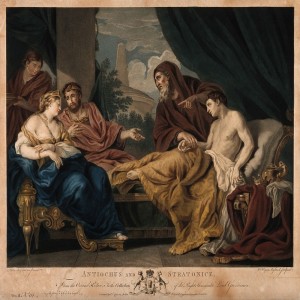
What is a more familiar bodily phenomenon than the pulse? We are so accustomed to the sensation of our pulse that it is easy to think this was always a part of human experience. But what if this was not always the case? When did physicians learn about the pulse, and how did it become so central to medical practice and to our own experiences of our bodies?
Let’s turn to Dr. Yakir Paz, who is interviewing Dr. Orly Lewis, a historian of medicine in antiquity.
image: Erasistratus, a physician, realizing that Antiochus's (son of Seleucus I) illness is lovesickness for his stepmother Stratonice, by observing that Antiochus's pulse rose whenever he saw her. Colored engraving by W.W. Ryland, 1772, after Pietro da Cortona. Credit: Wellcome Collection.
More Episodes
 2023-03-06
2023-03-06
 78
78
 2023-03-06
2023-03-06
 39
39
 2023-03-06
2023-03-06
 40
40
 2021-11-09
2021-11-09
 308
308
 2021-11-09
2021-11-09
 107
107
 2021-03-14
2021-03-14
 179
179
 2020-04-02
2020-04-02
 208
208
 2020-03-25
2020-03-25
 274
274
 2020-03-18
2020-03-18
 122
122
 2018-12-30
2018-12-30
 327
327
 2018-12-30
2018-12-30
 218
218
 2018-12-13
2018-12-13
 157
157
Create your
podcast in
minutes
- Full-featured podcast site
- Unlimited storage and bandwidth
- Comprehensive podcast stats
- Distribute to Apple Podcasts, Spotify, and more
- Make money with your podcast
It is Free
- Privacy Policy
- Cookie Policy
- Terms of Use
- Consent Preferences
- Copyright © 2015-2024 Podbean.com





